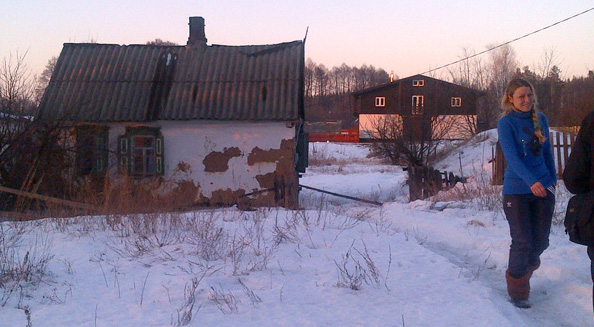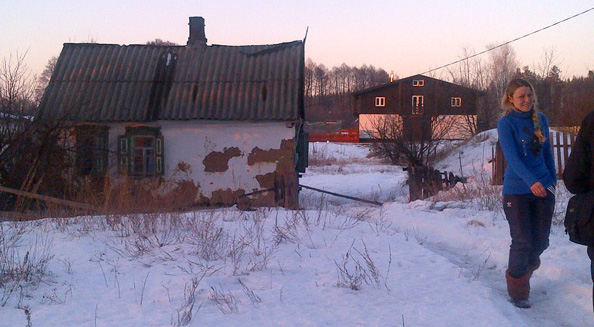

Media CenterCRS Assists Thousands Uprooted by the War in Eastern Ukraine

Ulyana Sergeyevna and her 8-year-old son, who fled their home in Eastern Ukraine, now live in a crumbling, drafty cottage, barely getting by.
Photo courtesy of Ambassador Clifford Bond.
By Kim Pozniak | Twitter @kimpoz
To say the lives of millions of Ukrainians have drastically changed amid the raging war in the country’s east is an understatement.
Take 27-year-old Ulyana Narbekova Sergeyevna, a trained attorney and single mother of an autistic son, her life was far from easy before the war, working to provide a middle-class living for her family while caring for her son’s special needs. But it was peaceful and secure.
Ulyana now spends her days in a cramped and crumbling cottage, fetching water to drink and washing her clothes in a bucket. She regularly walks along the isolated dirt road leading from the nearest town, a 45- minute drive away, to her cottage, trying to find firewood to keep her drafty home warm. Living like this is hard enough but sub-zero temperatures and regular snow fall are adding another level of hardship. But worst of all are the worries about the future.
“Families, who before the conflict, lived quite normal middle-class European lives, now find themselves crammed into a small room or two, or in an isolated cottage in a remote rural area, largely dependent on charity,” says Christian Hennemeyer, acting country manager for CRS Ukraine. “For many, the routine of work, supermarket shopping, and after-school activities has been replaced by the fear of a savage war that seems to have no end.”
Amid heavy fighting between pro-Russian separatist and Ukrainian government forces, Ulyana and her son fled their home in Gorlovka, a town in the eastern Donetsk region, in August 2014. In hopes the hostilities would end, they had persevered since the beginning of the conflict in late 2013, when anti-government protests led to the ouster of Ukraine’s President, followed by Pro-Russian opposition to the new administration and the eventual Russian invasion of Crimea.
Today, the war in Eastern Ukraine is called the bloodiest war since the Balkans: more than 5,000 people have been killed and another 1.5 million have fled their homes. After a period of relative calm in December, the result of a de facto ceasefire, violence between pro-separatist rebels—who identify with their Russian roots and seek independence from Ukraine—and Ukrainian forces fighting to keep the regions under government control, escalated again in mid-January 2015.
In addition, a controversial decision by the Ukrainian government to cut pensions and subsidies (due to dwindling resources) to those living in rebel-held territory prompted another wave of displacement. Thousands moved from the region to bigger cities in hopes of finding jobs and accessing social services from government and charitable organizations. Many of them have found refuge with family and friends, typically squeezing several family members into small living spaces. Others, like Ulyana, had to find shelter elsewhere.
While Ulyana still receives some government support pension payments, it is irregular and amounts to a mere $164 a month. Catholic Relief Services, with funding from the U.S. government, complements that amount with a monthly $300 subsidy, and though appreciated, Ulyana worries that it won’t last. Most of all, it isn’t enough to pay for the services her special needs son requires.
CRS, along with its local partner Caritas Ukraine, has been responding to the country’s growing humanitarian crisis since June 2014, when displacement in the east hit its peak, prompting joint distributions of emergency food, water and living supplies. CRS and Caritas Ukraine have also provided shelter subsidies and winterization support to 4,100 displaced and host families in the provinces of Kharkiv, Dnetropetrovsk, Donetsk, and Zaporizhia. CRS is also giving unconditional cash grants to those most in need to pay for rent, food, clothing and firewood, as well as helping people find work and lodging, and navigate the government bureaucracy.
As the violence continues, many displaced families don’t plan to return to their homes. The economy in the Donbas region has taken a large hit: At least 40,000 small and medium-sized businesses have closed, as have more than 60 percent of the Donbas region’s coal mines. People face difficulty in finding sustainable livelihoods options, and struggle to meet their basic needs.
“We are assisting thousands of people like Ulyana throughout Ukraine, ordinary people uprooted by a war most never saw coming,” Hennemeyer says. “And more are on the move every day as this sad, futile conflict rages on. Ukraine faces a potentially long-term population displacement that cannot be met only with short-term support. We need a long-term, strategic plan that encompasses basic needs, shelter, livelihoods, and protection. Some people have also been severely traumatized by the violence they’ve witnessed and will need counseling and emotional support.”
How You Can Help
You can donate to help families in Ukraine and around the world.
Related articles:
- CRS Partner Assisting People Affected by Unrest in Ukraine
- Pope Francis' Easter Message Spoke of Peace in Syria and Ukraine
- Prayer for the People of Ukraine
Kim Pozniak is Catholic Relief Services’ communications officer for Emergencies and Sub-Saharan Africa, based in Baltimore.


